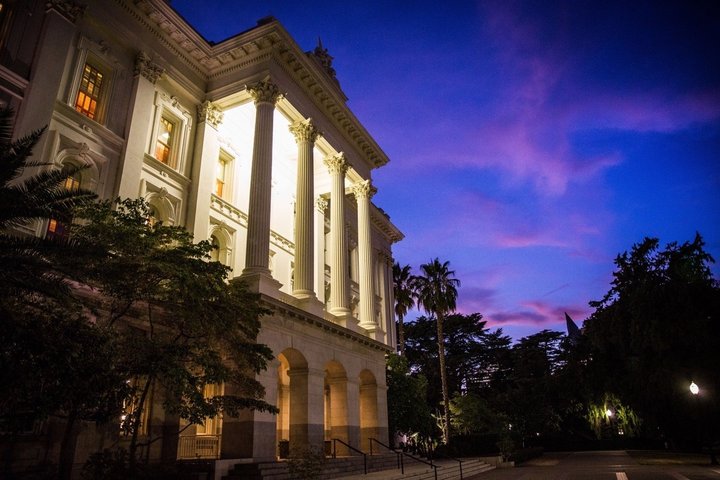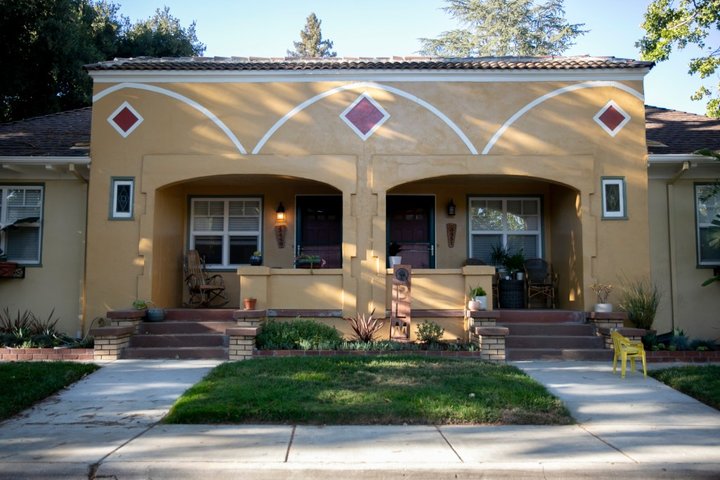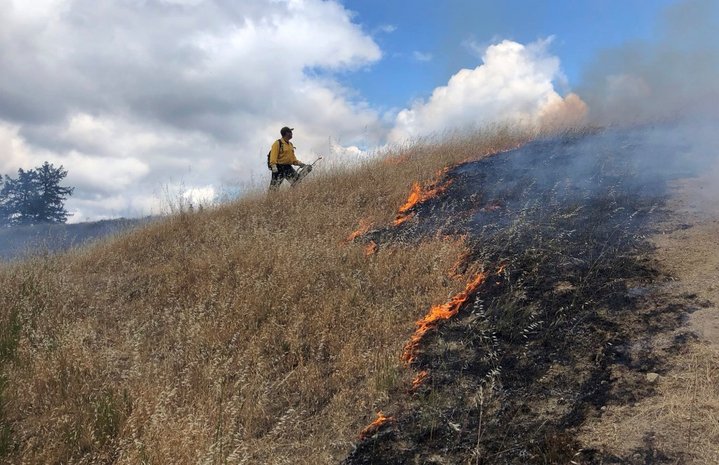
The State Capitol in Sacramento. Photo: Max Whittaker, CalMatters.
###
The second year of the coronavirus pandemic in California was shaped by two political undercurrents at the state Capitol: a budget awash with cash, thanks to a booming stock market and federal aid, and a looming recall election asking voters to throw Gov. Gavin Newsom out of office.
A massive budget surplus allowed Newsom and legislative Democrats to go big on a progressive agenda they believe will help the state recover from COVID hardships. They passed a $262.6 billion budget that includes:
- free preschool for all 4-year-olds
- lunch for all public school students
- state-funded health insurance for low-income undocumented immigrants age 50 and older
- grants for small business owners
- rent and utility relief for people who fell behind on their bills
- $600 stimulus payments for most Californians — landing in bank accounts just weeks before the Sept. 14 recall election.
Newsom found himself with so many dollars to spend that he gave away $115 million to encourage Californians to get the COVID-19 vaccine with a series of game-show style lotteries. That led to the surreal image of the governor on stage with life-size action figures and googly-eyed minions as he celebrated the reopening of amusement parks and handed out vaccine lottery checks under a shower of confetti.
But gobs of money and Democrats’ supermajority didn’t make everything possible. Tensions between moderate and liberal Democrats stymied many proposals. The recall threat also may have doomed some legislation that might have reflected unfavorably upon California and its governor. Bills that stalled included proposals to create single-payer health care, ban corporate donations to political candidates, legalize psychedelic drugs, sanction clinics where addicts can use illegal drugs under medical supervision, and allow people to turn their bodies into garden compost after death.
Still, lawmakers managed to send Newsom hundreds of bills, which he has until Oct. 10 to sign or veto. Even if voters oust him on Sept. 14, the transition period of as long as 38 days means the fate of these bills is in Newsom’s hands. Here are the most interesting or consequential decisions the governor faces.
— Laurel Rosenhall
Changing single-family zoning

A duplex in Sacramento on Aug. 4, 2021. Photo by Anne Wernikoff, CalMatters
WHAT THE BILLS WOULD DO
SB 9 would allow most homeowners across the state to build two houses or a duplex where now only one house is allowed. The bill, carried by a team of Democrats led by Senate leader Toni Atkins of San Diego, would also permit eligible homeowners to split their lot and add two more units on the second parcel — as long as it’s at least 1,200 square feet and outside fire hazard zones or historic districts. Owners would have to stay in their homes for at least three years after splitting their lots.
SB 10 by San Francisco Democratic Sen. Scott Wiener would let a local government rezone single-family parcels to allow as many as 10 units near public transit hubs and within urban areas.
Both bills would allow homeowners and developers to skip lengthy review processes, but projects would still ultimately be subject to final approval by the city.
WHO SUPPORTS THEM?
The growing Yes in My Backyard movement has been trying to increase density for years, with mostly failed attempts. Realtors, landlords, builders, developers and Facebook all back the bills, which were central to the affordable housing package put forward by state Senate leader Toni Atkins, a San Diego Democrat.
WHO’S OPPOSED?
Dozens of California cities, mayors and council members, including the Los Angeles City Council, say the zoning changes take away local flexibility, decision-making and community input. Neighborhood groups such as Livable California also argue the bill doesn’t create affordable housing, and could spur gentrification. Opponents are already organizing a ballot measure in November 2022 to reassert local control over zoning.
WHY IT MATTERS
About two-thirds of California is zoned for single-family homes, and California is short between 1.8 million and 3.5 million homes, which Newsom campaigned on building by 2025. While a zoning change won’t magically create the missing units, allowing building where it’s now illegal would add to the overall housing stock over time. Together, these bills are the most significant in years approved by the Legislature to address California’s housing crisis; a sweeping bill to reduce local control over zoning and create more affordable housing failed in 2018, 2019 and 2020.
GOVERNOR’S CALL: ?
Ending secret settlements
By Grace Gedye
WHAT THE BILL WOULD DO
SB 331 would ban employers from using secret settlements to prevent workers from speaking out about all kinds of illegal harassment or discrimination, with some limited exceptions. Carried by Democratic Sen. Connie Leyva of Chino, it builds on a law passed in 2018, which limited the use of non-disclosure agreements to settle cases of sexual discrimination, harassment or assault.
WHO SUPPORTS IT
A bevy of legal groups, labor groups, and women’s advocacy groups support the bill. It is co-sponsored by California Employment Lawyers Association, Equal Rights Advocates and Ifeoma Ozoma, a former public policy official at Pinterest who broke her non-disclosure agreement to speak out about discrimination she says she faced at the company. They say secret settlements perpetuate workplace discrimmination and harassment because they prevent survivors from speaking out.
WHO’S OPPOSED
Initially, objectors included a group of businesses and trade associations, helmed by the California Chamber of Commerce, arguing that the bill would effectively end the use of severance agreements. Businesses that choose to use severance agreements often do so in part to safeguard against potential reputational harm. In response to several amendments, such as one that allowed employers to keep the size of severance payments confidential, the Chamber and other groups withdrew their formal opposition.
WHY IT MATTERS
Non-disclosure agreements are used widely among the world’s most powerful tech companies, many of which are based in California. Other industries use them too. By allowing workers to come forward with their allegations, this bill could prevent repeat offenders from harassing others. It would also allow workers to discuss their experiences with family and friends even if they decide not to go public — something many of these agreements prohibit. The flip side: Businesses concerned about protecting themselves against reputational harm would have one less tool in their toolkit if this bill becomes law.
GOVERNOR’S CALL: ?
Legal protection for prescribed burns

A prescribed burn in 2019. Photo courtesy of Lenya Quinn-Davidson, University of California Cooperative Extension/Humboldt County Prescribed Burn Association
By Julie Cart
WHAT THE BILL WOULD DO
The state is more frequently handing off some responsibility for off-season prescribed burns to local fire-safe community groups and tribes. SB 332 by Democratic Sen. Bill Dodd of Napa would provide legal and liability cover to those entities should the fires they set get away from them.
WHO SUPPORTS IT
The bill is supported by a broad base of groups, including farming and ranching advocates, local fire-safe organizations and firefighting professionals. Supporters say the bill would remove a financial disincentive and create more fuel breaks to save lives and structures.
WHO’S OPPOSED
Insurer and attorney groups opposed the bill, saying that lowering the legal accountability for those who set prescribed burns will bring an “unintended affect (that) will be catastrophic for California’s property and people.”
WHY IT MATTERS
Wildfire experts agree that a powerful prescriptive against fires is to safely set them under precise conditions to reduce the fuels — trees and brush — available to burn, especially around communities. The state has agreed to an ambitious prescribed-burn program and is training local officials and volunteers to carry out the fires. But fear of liability should the fire accidentally escape has prevented broader adoption of the program.
GOVERNOR’S CALL: ?
Greater access to police records

Police officers in Balwin Park on Aug. 6, 2019. Photo by Anne Wernikoff for CalMatters
WHAT THE BILL WOULD DO
SB 16 by Berkeley Democratic Sen. Nancy Skinner would expand the public’s access to police records — allowing them to view sustained findings in which an officer used unreasonable force, failed to intervene when another officer used excessive force, engaged in racist or biased behavior, or conducted unlawful arrests and searches. It also would allow release of records after an officer resigns, put a 45-day limit on when agencies must respond to records requests, and remove the time limit on when judges can consider police misconduct complaints to be admissible in criminal cases.
WHO SUPPORTS IT
The American Civil Liberties Union, the California News Publishers Association, the California Public Defenders, the California Police Chiefs Association and a long list of civil rights organizations. Supporters see this bill as a way to hold more police accountable.
WHO’S OPPOSED?
Originally opponents included the League of California Cities, which argued that the bill would place a substantial burden on city budgets, and the California State Sheriffs’ Association, which contended the bill was too broad. Both dropped their opposition after the bill was amended to limit mandatory release of information only in sustained cases, not every incident.
WHY IT MATTERS
California is one of the most restrictive states in the nation when it comes to releasing police misconduct records. In 2018, the Legislature passed a law giving the public access to police records if officers lied during an investigation, sexually assaulted someone, or used their guns or other force in a case in which someone was seriously injured or died. This bill would further expand that access.
GOVERNOR’S CALL: ?
Teaching mental health
WHAT THE BILL WOULD DO
SB 224 would mandate mental health instruction in middle schools and high schools that have an existing health education course. Supporters hope that such instruction would eventually be required in all schools statewide. Content would cover a range of topics, including habits that promote mental wellness, signs and symptoms of common mental health conditions and ways to seek help.The bill is carried by Democratic Sens. Anthony Portantino of La Cañada Flintridge and Susan Rubio of Baldwin Park.
WHO SUPPORTS IT
A coalition of nearly 50 organizations that advocate for mental health, children’s rights, disability rights and civil rights, along with the California Hospital Association and the American Academy of Pediatrics, support the bill. They say it’s crucial to reduce stigma and normalize conversations about mental health in schools, since that’s where children and adolescents spend the majority of their time.
WHO’S OPPOSED
No current opposition. To address concerns raised by teachers unions, the bill’s scope was reduced to include only schools with current health education programs, as opposed to all schools in the state.
WHY IT MATTERS
Over the past decade, rates of hospitalization for mental health emergencies have been skyrocketing among children and adolescents. Between 2012 and 2019, California emergency rooms reported a 42% increase in the number of children they were treating for mental illness. The pandemic has further exacerbated the trend.
GOVERNOR’S CALL: ?
Vote-by-mail for farmworker union elections
By Grace Gedye
WHAT THE BILL WOULD DO
Currently, farmworker union elections are held in-person, often on the grower’s property. AB 616 by Democratic Assemblymember Mark Stone of Santa Cruz would give farmworkers the option to vote at home — or anywhere else they like — in union elections. Then they could deliver or send their ballot, sealed in a signed envelope, to the state board that oversees farmworker union elections, or they could give it to an organizer to deliver on their behalf.
WHO SUPPORTS IT
Labor groups and unions, including United Farm Workers, which sponsored the bill. They say it would make union elections more accessible to farmworkers.
WHO’S OPPOSED
Business groups, like California Chamber of Commerce, and groups that represent the interests of farm owners, like the Western Growers Association, oppose the bill. They say they’re concerned about workers being pressured into voting a certain way if this bill is enacted. Workers are allowed to have a witness present when they vote at home under this bill.
WHY IT MATTERS
The rate of unionization among farm workers is incredibly low — approximately 0% according to analysis from UC Merced. Unions are linked to higher wages and better benefits for workers. This bill would give farm workers another way to participate in union elections and could speed up the election process.
GOVERNOR’S CALL: ?
Adding dependent parents to your health plan

A nurse practitioner examines an elderly patient at a clinic in Guerneville in February 2020. Photo by Anne Wernikoff for CalMatters
WHAT THE BILL WOULD DO
AB 570 would require health insurance plans to make coverage available to their members’ dependent parents. Under federal law, people already can add their children up to age 26 to their health plans. Through this bill, authored by Assemblymember Miguel Santiago, a Los Angeles Democrat, California would be the first state to expand this benefit to include parents. This bill applies only to private state-regulated health plans.
WHO SUPPORTS IT
The bill was sponsored by state Insurance Commissioner Ricardo Lara and health care advocacy and immigrant rights organizations as a way to expand coverage and help a family reduce health care costs by having all family members covered by the same plan.
WHO’S OPPOSED
The California Association of Health Plans and the California Chamber of Commerce initially argued that the bill would raise premiums, but dropped their opposition after the bill was amended to exclude employer-sponsored and group plans.
WHY IT MATTERS
The bill, which the state estimates would benefit up to 15,000 people, could be most helpful to middle-class families with undocumented parents who don’t qualify for Medicare or subsidized coverage through the state’s marketplace. This year’s state budget opened the state’s Medi-Cal program to low-income undocumented people 50 and older and removed some barriers for older Californians.
GOVERNOR’S CALL: ?
Gender-neutral toy sections
By Grace Gedye
WHAT THE BILL WOULD DO
AB 1084 would require large department stores that sell kids’ products to maintain a gender-neutral section of toys and child care items. Stores that do not comply would face a light penalty: a fine of up to $250 for first offenses, and a fine of up to $500 for second offenses. It’s carried by Democratic Assemblymembers Evan Low of San Jose and Cristina Garcia of Bell Gardens.
WHO SUPPORTS IT
The Phluid Project, which partners with brands to distribute gender-free clothing and accessories, argues that the bill will increase freedom of expression for children and parents. It’s also backed by Equality California and the Consumer Federation of California, which says that products marketed to girls often have higher price tags.
WHO’S OPPOSED
Socially conservative groups including the Capitol Resource Institute and California Family Council say it’s not the state’s role to mandate how stores market their products. Retailers objected to an earlier version of the bill that included children’s clothing, a provision since removed from the bill.
WHY IT MATTERS
This bill might not radically alter Californians’ shopping experiences: Some large stores already organize their toys by type of product rather than by gender. But it’s a foot in the door for advocates who could push for bigger change in the future.
GOVERNOR’S CALL: ?
###
CALmatters.org is a nonprofit, nonpartisan media venture explaining California policies and politics.
CLICK TO MANAGE